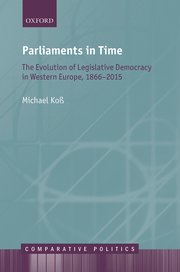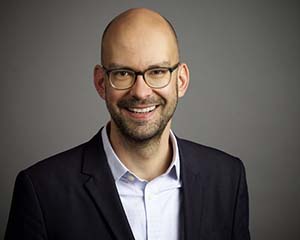Install the app
Install this application on your home screen for quick and easy access when you’re on the go.
Just tap then “Add to Home Screen”
Install this application on your home screen for quick and easy access when you’re on the go.
Just tap then “Add to Home Screen”
Install this application on your home screen for quick and easy access when you’re on the go.
Just tap then “Add to Home Screen”
 New in the OUP / ECPR Comparative Politics series is Parliaments in Time: The Evolution of Legislative Democracy in Western Europe, 1866–2015 by Michael Koß
New in the OUP / ECPR Comparative Politics series is Parliaments in Time: The Evolution of Legislative Democracy in Western Europe, 1866–2015 by Michael Koß
This book analyses ninety procedural reforms which restructured control over the plenary agenda and committee power in Britain, France, Sweden, and Germany between 1866 and 2015.
Legislatures evolve towards one of two procedural ideal types: talking (where governments control the agenda) or working legislatures (with powerful committees). All else being equal, legislators' demand for mega-seats on legislative committees triggers the evolution of working legislatures.
If, however, legislators fail to centralise agenda control in response to anti-system obstruction, legislative procedures break down.
Rather than a decline of legislatures, talking legislatures accordingly indicate the resilience of legislative democracy. In conclusion, the book shows the causal nexus between procedural reforms and (legislative) democracy.
Speaking to ECPR about his new book, Michael told us:
'The research for this book grew out of a previous project in which I explained party funding regimes with patterns of political competition. This of course raised the question of how to explain patterns of competition. To do so, I looked at legislatures which best allow for systematic comparisons over time and space.
I soon understood that the distribution of agenda control, i.e. the power to put legislative proposals on the parliamentary timetable, to alter them, and to put them to a vote, was the proper institutional mechanism to study. What I originally had no idea of (thankfully, in retrospect) was that I needed to go as far back as the late 19th century and that I additionally needed to look at committee power which, as it turned out, together with agenda control follows the logic of communicating pipes.
All else being equal, you either privilege the majority with respect to agenda control or empower committees, both of which serves as a response to the growth of legislative proposals after 1866 – hence the need for a long-term comparison.
This research design gave rise to the question of what exactly explains whether legislators chose to privilege majorities or to empower committees. The answer, to let the truth be known, came as a surprise to me. Only if confronted with the danger of a breakdown of legislative procedures were legislators willing to privilege majorities procedurally. Even more surprisingly, in some instances, they even ignored or dismissed this danger, with the consequences that procedures actually broke down. From this I concluded that my research and, accordingly, the book, deals with legislative democracy.
Legislatures such as the House of Commons are often regarded as weak. In the light of the analysis presented in Parliaments in Time, such legislatures rather illustrate the resilience of legislative democracy.'
 About Michael
About MichaelMichael Koß is Professor of Comparative Politics at the Geschwister-Scholl-Institute of Political Science, Ludwig-Maximilians-University Munich.
His publications include:
The Politics of Party Funding (OUP, 2011)
Left Parties in National Governments
(co-edited with Jonathan Olsen and Dan Hough, Palgrave, 2010)
The Left Party in Contemporary German Politics
(co-authored wtih Dan Hough and Jonathan Olsen, Palgrave, 2007)
Keywords: Democracy, European Politics, Parliaments